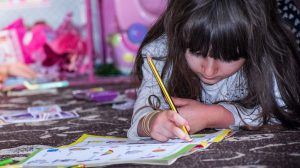Last week, we spoke to 3 young people in care aged 14 to 17.
Teresa, Sophie and India are active in their local children in care council. They have been writing newsletters and have prepared ‘lockdown rucksacks’ with activities for children in care so that they don’t feel bored. They have also stayed in contact and reached out to other young people in care.
They have all had different experiences of education over the past few weeks. Sophie had been using Microsoft Teams for college lessons. But now she has finished all her course work, and she is really just waiting to hear what is going to happen next. Teresa doesn’t have online lessons, but her teacher has been calling every week. India had one lesson a week and is expected to do homework. They didn’t quite see why primary schools would go back first because they feel it will be more difficult for small children to socially distance. For them, September feels a long time away for going back to school. They also thought going back to school part time could be a good solution, rather than having everyone start at the same time.
Teresa said she would like to go back to school. She says it gives her normality, routine and she likes seeing her friends at school. But they’re all still talking to their friends, mainly via Facetime. India said it’s been difficult for her to feel motivated not being in the classroom environment. She couldn’t get herself to do all the work without the support through catch up classes and tutor support that she normally receives.
Some of the messages that have been coming out around social distancing, they found confusing. They felt that many people weren’t taking the situation seriously enough any more, and that some young people may feel pressured by their friends to meet up.
Like other groups we have spoken with, Teresa, Sophie and India also thought that there should be an opportunity for children and young people to ask questions to the government. They had a few questions they would like answered and they also had suggestions.
Firstly, they wanted to know what has been put in place to support social services for more children coming into care. They told us that at the moment, no one will know what kinds of problems are happening in people’s homes, and that’s where support is going to be needed most. They also thought that more could be done for children so they could see their social workers, for example through a socially distanced meeting, and that social workers should be supported in this.
Teresa shared that the contact with her social worker has become worse since lockdown. She understands that she may not be their priority as her social worker is working with many children and the younger children may be more of a priority, but the problem she would like to talk about just never gets talked about because there is never time for it. And this may be similar for other children. Speaking about their Independent Reviewing Officer, India didn’t know who hers was; and Teresa and Sophie aren’t talking to theirs.
They also wondered why didn’t lockdown come earlier? They said if this happened it could have prevented coronavirus cases and deaths.
They wanted to know too what the next steps were for lockdown. They suggested that government messaging should be clearer and needs to be explained better. At the moment, it’s too vague, they said.
India asked that teachers don’t pressure students. She said considering all the work she had been given, she wouldn’t be able to have it all completed and that will be stressful for her. Teresa agreed that there should be understanding, and that they shouldn’t have to feel pressured about completing all their work. They would welcome more support for wellbeing and mental health and said they have found virtual schools had been slow to provide equipment and tutoring.
They would also like more clarity about their education. Sophie’s coursework is in placement and, at the moment,, she doesn’t know whether she’ll be able to pass in some other way. Teresa, who is in year 10, said it’s very confusing for year 10s. It’s a crucial year as you’re learning everything that’s important for year 11, and your GCSEs. She was wondering whether they might have to do an extra year.
*names were changed*






